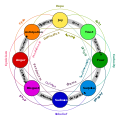Phenomenology
In phenomenological research, lived experiences are the main object of study, [6] but the goal of such research is not to understand individuals' lived experiences as facts, but to determine the understandable meaning of such experiences. [7] [8] In addition, lived experience is not about reflecting on an experience while living through it but is recollective, with a given experience being reflected on after it has passed or been lived through. [9]
Philosophy
In the philosophy of Wilhelm Dilthey, the human sciences are based on lived experience, which makes them fundamentally different from the natural sciences, which are considered to be based on scientific experiences. [10] The concept can also be approached from the view that since every experience has both objective and subjective components, it is important for a researcher to understand all aspects of it. [11]
Feminist epistemologies situate knowing in the lived experiences of each person. Because each person has a unique standpoint that is shaped by their lived experiences and identities, they have different understandings of how the world works, and what is "true" for one person may not be for another. While one standpoint does not have more value than another, feminist philosophers argue that people from marginalized groups tend to have their knowledge discredited, and their lived experiences become undervalued. As such, they believe efforts should be made to highlight and uplift their voices. [12]
Academia
In academia, lived experiences can be seen as valuable sources of information. [13] [14] Instead of hiding behind ideals of neutrality, educators are encouraged to be vulnerable and center their humanity, embracing the differences between lived experiences and what they bring to new ways of knowing. [13]
Treating lived experiences as important data points in academic research can also serve to decolonize traditional bodies of knowledge, centering the viewpoints and lives of people from a variety of backgrounds and expanding what we consider truth and thus respect different ways of knowing. [13] [14] Similarly, critical disability theory argues that researchers should take the lived experience of people with norm-breaking functionality into account in their studies, further expanding the knowledge that can be gained from diverse perspectives. [15] In this way, accepting lived experiences into research is a form of social justice. [14]
In Myalgic Encephalomyelitis/CFS
In the context of myalgic encephalomyelitis/chronic fatigue syndrome (ME/CFS), the use of lived experience has become increasingly prominent in research and healthcare. Due to the absence of definitive biomarkers or effective treatments, patient perspectives are incorporated to improve relevance and patient-centeredness. Initiatives such as the DecodeME study and the Solve M.E. Lived Experience Taskforce involve patients in research design and policy development. Qualitative studies have shown that integrating lived experience can enhance understanding of the condition’s social and psychological impacts. [16]
This page is based on this
Wikipedia article Text is available under the
CC BY-SA 4.0 license; additional terms may apply.
Images, videos and audio are available under their respective licenses.

